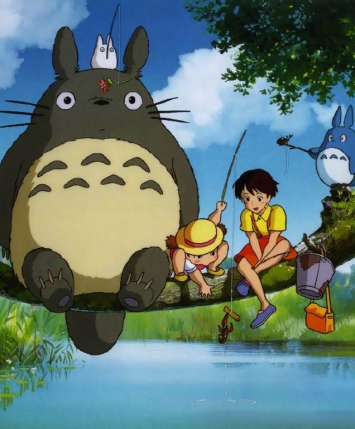
Mike and Casey hitch a ride on the Catbus with our friend Roslyn Townsend and animator and storyboard artist Lauren Montgomery (Justice League: Doom, Wonder Woman) to talk about the legendary animator who is often referred to as “Japan’s Walt Disney,” Hayao Miyazaki.
They discuss Miyazaki’s decades-long filmography from Princess Mononoke to My Neighbor Totoro. They dive into topics like giant killer insects, nature spirits, witches, animated violence, children, and what it is about the man’s work that is so iconic, memorable, gorgeous and often unsettling.
Music:
“Theme from My Neighbor Totoro“ by Joe Hisaishi
Previously titled: “All Children are Born Completely Drunk”
Podcast: Play in new window | Download

The point that Mike makes about Miyazaki offering kids intelligent narrative beyond binary good/evil is important. Earlier, there’s a comment that Miyazaki offers up pure fantasy. I think that the strength of his work is that he doesn’t. His work is immersive, but it’s not ‘pure fantasy’ because it avoids offering easy solutions.
You can’t just label people as ‘heroes’ or ‘villains’. It’s not like you’re being offered Orcs, Decepticons or whatever who are evil because they’re evil (which, when you apply it to the real world, is kind of a disturbing lesson to offer children). Some people do bad things when they’re trying to do good things… just like in the real life, people don’t know what ‘the good thing’ is, so they just have to make their best guess… and sometimes they’re wrong.
Also, sometimes in the end, there’s no resolution. Unlike a Disney cartoon, love doesn’t save the day. The protagonist has to WORK to achieve their goals, and often, with that success comes sacrifice.
In ‘Arietty’ for instance, the Borrowers have to leave, and the message is there saying that the places in the world where they can live are shrinking and there’s no solution to that. In ‘Kiki’s Delivery Service’, Kiki’s growing up and there’s no way to stop that. In ‘My Neighbour Totoro’, one day, the kids will grow up and no longer have magical adventures with mystical creatures… not only does it resist the Disney idea of ‘easy delineations between good and evil’ but also the ‘easy solution of love saving the day’.
And I just remembered my initial point. I think his gripe about animation is that so much of it is a sop. There’s no point to it beyond ‘escapism’.
No matter how fantastical his work is, there’s always a message. Each one tries to reach out beyond the screen and touch the real world somehow, whether it’s an environmental message, an inspiration, or just encouraging people to think more about things rather than go for the easy answer, or the easy characterization.
By making the hero’s goals difficult, and the path to achieving those goals not at all obvious, he’s saying, “Life is hard. Try and do good. Make the world better. Be active.”
I really enjoyed this episode, and everyone was pretty spot on with their observations. I was also thrilled that Mike listed Nausicaä of the Valley of the Wind as his favorite Miyazaki flick, because its mine as well.
There is one thing I would like to nitpick, and it is something that was repeated a couple times throughout the podcast: the genre of anime. Anime is a blanket term for animation from Japan. That seems pretty vague for anime to be a genre. It would be similar if one said “foreign film” is a genre. Both anime and foreign films are not a medium, but they aren’t genre either. Its just describes a large collection of a medium that falls into one broad category. Would Amelie be the same genre as The Girl with the Dragon Tattoo? Or How bout Cannibal Holocaust and Life is Beautiful? Each of those films falls into its own genre, just like anime would. Ghost in the Shell, Grave of the Fireflies, Perfect Blue, and Steamboy are all anime, but belong in there own genres: sci-fi, drama, psychological thriller, and adventure (respectively). Those four films, while being “anime”, are very different from each other, just like any four American made movies.
OK, now that I can stop being that guy, I would like to thank the hosts and guests for a great episode. I tried this podcast a couple months ago after hearing a bunch of commercials for it on Ask an Atheist. Well the commercials worked. I’ve listened to all of them, even the Superman one (I know nothing about superman aside from the old 50’s show and the movie with Richard Pryor, but the episode was still interesting). Keep up the good work!
Also, if I could recommend another anime director to you guys, it would be Satoshi Kon. Perfect Blue, Tokyo Godfathers, Millennium Actress, Paprika, Paranoia Agent are widely praised and acclaimed (as they should be), and I couldn’t agree more. The only sad thing is that Kon passed away due to cancer a couple years ago, so those works are all that he made (at least he never made a dud).